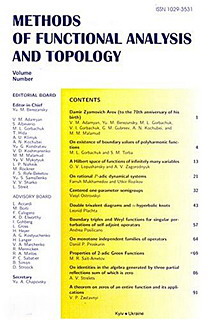Vol. 13 (2007), no. 3
$pg$-frame in Banach spaces
M. R. Abdollahpour, M. H. Faroughi, A. Rahimi
MFAT 13 (2007), no. 3, 201-210
201-210
For extending the concepts of $p$-frame, frame for Banach spaces and atomic decomposition, we will define the concept of $pg$-frame and $g$-frame for Banach spaces, by which each $f\in X$ ($X$ is a Banach space) can be represented by an unconditionally convergent series $f=\sum g_{i}\Lambda_{i},$ where $\{\Lambda_{i}\}_{i\in J}$ is a $pg$-frame, $\{g_{i}\}\in(\sum\oplus Y_{i}^{*})_{l_q}$ and $\frac{1}{p}+\frac{1}{q}=1$. In fact, a $pg$-frame $\{\Lambda_{i}\}$ is a kind of an overcomplete basis for $X^{*}.$ We also show that every separable Banach space $X$ has a $g$-Banach frame with bounds equal to $1.$
The $\varepsilon_{\infty}$-product of a $b$-space by a quotient bornological space
MFAT 13 (2007), no. 3, 211-222
211-222
We define the $\varepsilon_{\infty }$-product of a Banach space $G$\ by a quotient bornological space $E\mid F$ that we denote by $G\varepsilon _{\infty }(E\mid F)$, and we prove that $G$ is an $% \mathcal{L}_{\infty }$-space if and only if the quotient bornological spaces $G\varepsilon _{\infty }(E\mid F)$ and $% (G\varepsilon E)\mid (G\varepsilon F)$ are isomorphic. Also, we show that the functor $\mathbf{.\varepsilon }_{\infty }\mathbf{.}:\mathbf{Ban\times qBan\longrightarrow qBan}$ is left exact. Finally, we define the $\varepsilon _{\infty }$-product of a b-space by a quotient bornological space and we prove that if $G$ is an $% \varepsilon $b-space\ and $E\mid F$ is a quotient bornological space, then $(G\varepsilon E)\mid (G\varepsilon F)$ is isomorphic to $G\varepsilon _{\infty }(E\mid F)$.
On non-densely defined invariant Hermitian contractions
MFAT 13 (2007), no. 3, 223-235
223-235
We consider a non-densely defined Hermitian contractive operator which is unitarily equivalent to its linear-fractional transformation. We show that such an operator always admits self-adjoint extensions which are also unitarily equivalent to their linear-fractional transformation.
Generalized Krein algebras and asymptotics of Toeplitz determinants
A. Böttcher, A. Karlovich, B. Silbermann
MFAT 13 (2007), no. 3, 236-261
236-261
We give a survey on generalized Krein algebras $K_{p,q}^{\alpha,\beta}$ and their applications to Toeplitz determinants. Our methods originated in a paper by Mark Krein of 1966, where he showed that $K_{2,2}^{1/2,1/2}$ is a Banach algebra. Subsequently, Widom proved the strong Szego limit theorem for block Toeplitz determinants with symbols in $(K_{2,2}^{1/2,1/2})_{N\times N}$ and later two of the authors studied symbols in the generalized Krein algebras $(K_{p,q}^{\alpha,\beta})_{N\times N}$, where $\lambda:=1/p+1/q=\alpha+\beta$ and $\lambda=1$. We here extend these results to $0< \lambda <1$. The entire paper is based on fundamental work by Mark Krein, ranging from operator ideals through Toeplitz operators up to Wiener-Hopf factorization.
On solutions to "almost everywhere" - Euler-Lagrange equation in Sobolev space $W_2^1$
MFAT 13 (2007), no. 3, 262-266
262-266
It is known, that if the Euler--Lagrange variational equation is fulfilled everywhere in classical case $C^1$ then it's solution is twice continuously differentiable. The present note is devoted to the study of a similar problem for the Euler--Lagrange equation in the Sobolev space $W_{2}^{1}$.
Direct theorems in the theory of approximation of Banach space vectors by exponential type entire vectors
MFAT 13 (2007), no. 3, 267-278
267-278
For an arbitrary operator $A$ on a Banach space $X$ which is the generator of a $C_0$--group with certain growth condition at infinity, direct theorems on connection between the degree of smoothness of a vector $x\in X$ with respect to the operator $A$, the rate of convergence to zero of the best approximation of $x$ by exponential type entire vectors for the operator $A$, and the $k$-module of continuity are established. The results allow to obtain Jackson-type inequalities in a number of classic spaces of periodic functions and weighted $L_p$ spaces.
On cloused ideals of entire functions of finite gamma-growth
K. G. Malyutin, V. O. Gerasimenko
MFAT 13 (2007), no. 3, 279-283
279-283
We extend the result of Beurling on the closure in $H^p$ of the linear manifold $F(z)\cdot $$ \{$polynomials of $z\}$ to the classes of entire functions of finite gamma-growth.
The set of discontinuity points of separately continuous functions on the products of compact spaces
MFAT 13 (2007), no. 3, 284-295
284-295
We solve the problem of constructing separately continuous functions on the product of compact spaces with a given set of discontinuity points. We obtain the following results. 1. For arbitrary \v{C}ech complete spaces $X$, $Y$, and a separable compact perfect projectively nowhere dense zero set $E\subseteq X\times Y$ there exists a separately continuous function $f:X\times Y\to\mathbb R$ the set of discontinuity points, which coincides with $E$. 2. For arbitrary \v{C}ech complete spaces $X$, $Y$, and nowhere dense zero sets $A\subseteq X$ and $B\subseteq Y$ there exists a separately continuous function $f:X\times Y\to\mathbb R$ such that the projections of the set of discontinuity points of $f$ coincides with $A$ and $B$, respectively. We construct an example of Eberlein compacts $X$, $Y$, and nowhere dense zero sets $A\subseteq X$ and $B\subseteq Y$ such that the set of discontinuity points of every separately continuous function $f:X\times Y\to\mathbb R$ does not coincide with $A\times B$, and a $CH$-example of separable Valdivia compacts $X$, $Y$ and separable nowhere dense zero sets $A\subseteq X$ and $B\subseteq Y$ such that the set of discontinuity points of every separately continuous function $f:X\times Y\to\mathbb R$ does not coincide with $A\times B$.
About one class of Hilbert space uncoditional bases
A. A. Tarasenko, M. G. Volkova
MFAT 13 (2007), no. 3, 296-300
296-300
Let a sequence $\left\{v_k \right\}^{+\infty}_{-\infty}\in l_2$ and a real sequence $\left\{\lambda_k \right\}^{+\infty}_{-\infty}$ such that $\left\{\lambda_k^{-1} \right\}^{+\infty}_{-\infty}\in l_2$, and an orthonormal basis $\left\{e_k \right\}^{+\infty}_{-\infty}$ of a Hilbert space be given. We describe a sequence $M=\left\{\mu_k \right\}^{+\infty}_{-\infty}$, $M\cap \mathbb{R}=\varnothing$, such that the families $$ f_k = \sum\limits_{j\in\mathbb{Z}} {v_j\left(\lambda_j-\bar{\mu}_k \right)^{-1}}e_k, \quad k\in \mathbb{Z} $$ form an unconditional basis in $\mathfrak{H}$.


